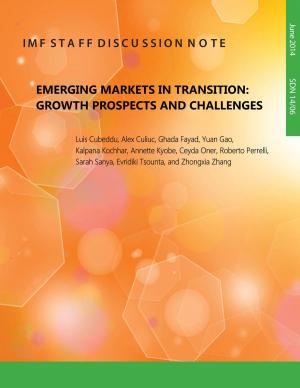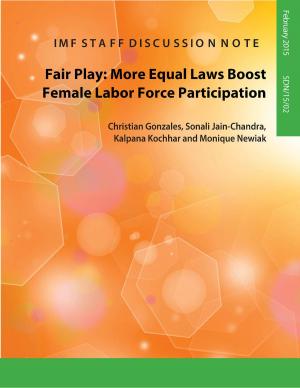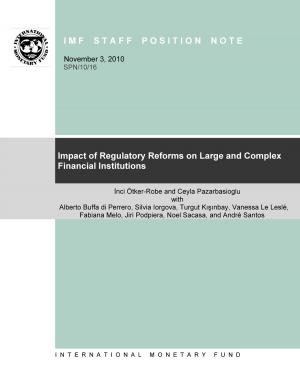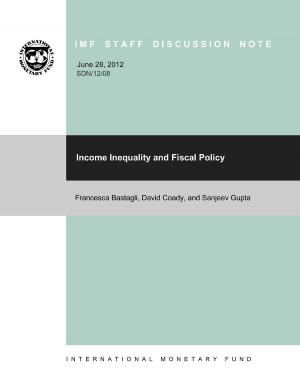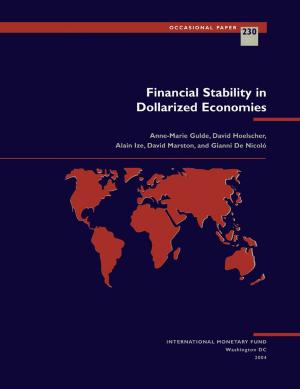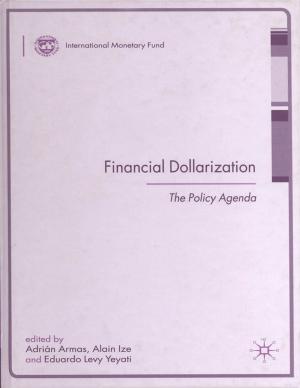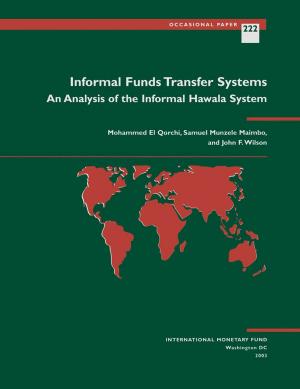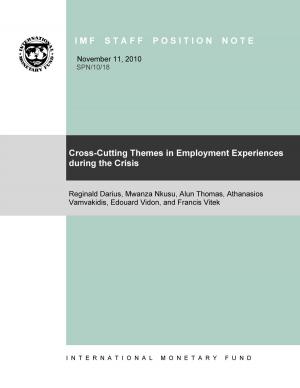International Monetary Fund imprint: 1365 books
by Luis M. Mr. Cubeddu, Alexander Mr. Culiuc, Ghada Ms. Fayad
Language: English
Release Date: June 12, 2014
Language: English
Release Date: June 12, 2014
After a short-lived slowdown in the immediate aftermath of the global financial crisis and a swift rebound, emerging markets (EM) are now entering a period of slower growth. In fact, growth is now lower than the post-crisis peak of 2010-11, as well as the rates seen in the decade before the crisis....
Fair Play:
More Equal Laws Boost Female Labor Force Participation
Language: English
Release Date: February 17, 2015
This Staff Discussion Note examines the effect of gender-based legal restrictions and other policy choices and demographic characteristics on female labor force participation. Drawing on a large and novel panel data set of gender-related legal restrictions, the study finds that restrictions on women’s...
by Inci Ms. Ötker, Ceyla Pazarbasioglu
Language: English
Release Date: November 3, 2010
Language: English
Release Date: November 3, 2010
Financial sector reforms are being considered to address the risks posed by large and complex financial institutions (LCFIs). The vast majority of global finance is intermediated by a handful of these institutions with growing interconnections within and across borders. Common trends that contributed...
by Antonio Mr. Spilimbergo, Eswar Mr. Prasad, Paolo Mr. Mauro
Language: English
Release Date: May 17, 1999
Language: English
Release Date: May 17, 1999
The third stage of European Economic and Monetary Union (EMU) was implemented in January 1999 against the specter of persistently high unemployment in many of the participating countries. While the high European unemployment has received considerable attention, this new IMF staff study analyzes an equally...
by David Coady, Sanjeev Mr. Gupta
Language: English
Release Date: June 28, 2012
Language: English
Release Date: June 28, 2012
This note will describe recent trends in income inequality in both advanced and developing economies and how tax and expenditure policies have impacted on these trends. It will discuss how tax and expenditure policies should be designed to bring about a more equitable distribution of income, as well as to protect the most vulnerable populations during periods of fiscal consolidation.
by Jonathan Mr. Ostry, Atish Mr. Ghosh, Raphael Espinoza
Language: English
Release Date: June 1, 2015
Language: English
Release Date: June 1, 2015
What considerations should guide public debt policy going forward? Should debt be reduced to achieve normative anchors (such as 60 percent of GDP), should it be increased further to finance a big public investment push, or should the existing debt be serviced forever? We argue that, for countries with...
by Jonathan Mr. Ostry, Mahvash Saeed Qureshi, Karl Mr. Habermeier
Language: English
Release Date: February 19, 2010
Language: English
Release Date: February 19, 2010
With the global economy beginning to emerge from the financial crisis, capital is flowing back to emerging market countries (EMEs). These flows, and capital mobility more generally, allow countries with limited savings to attract financing for productive investment projects, foster the diversification...
by Carmen Ms. Reinhart, Mohsin Mr. Khan
Language: English
Release Date: October 6, 1995
Language: English
Release Date: October 6, 1995
The developing economies of the Asia Pacific Economic Cooperation (APEC) have been the recipients of a considerable volume of capital inflows in the 1990s. Given the increased integration of capital markets, it is not surprising that monetary control became more difficult for many developing APEC...
by
Language: English
Release Date: August 21, 2000
Language: English
Release Date: August 21, 2000
A growing number of countries are anchoring their monetary policy through explicit inflation targeting. This policy has already scored remarkable successes in several countries, establishing central bank credibility, and reining in inflation where it had long been stubbornly high. But implementing inflation...
by Anne Ms. Gulde, David Mr. Hoelscher, Alain Mr. Ize
Language: English
Release Date: June 15, 2004
Language: English
Release Date: June 15, 2004
This paper addresses the challenges to prudential supervision in highly dollarized economies, where central banks and supervisors may be constrained in the use of standard money and financial policy tools. The study’s conclusions are the basis of an ongoing policy dialogue with IMF member countries,...
by Adrián Armas, Eduardo Mr. Levy Yeyati, Alain Mr. Ize
Language: English
Release Date: July 25, 2006
Language: English
Release Date: July 25, 2006
Financial (unofficial) dollarization is widely seen as a critical source of financial fragility in both developing and emerging economies. This volume provides a rigorous and balanced perspective on the causes and implications of dollarization, and the basic policies and options to deal with it: the...
by Mohammed Mr. El Qorchi, Samuel Mr. Maimbo, John Mr. Wilson
Language: English
Release Date: August 18, 2003
Language: English
Release Date: August 18, 2003
Since the terrorist attacks of September 11, 2001, there has been increased public interest in informal funds transfer (IFT) systems. This paper examines the informal hawala system, an IFT system found predominantly in the Middle East and South Asia. The paper examines the historical and socioeconomic...
by Florence Ms. Jaumotte, Carolina Ms. Osorio
Language: English
Release Date: July 10, 2015
Language: English
Release Date: July 10, 2015
The SDN examines the role of labor market institutions in the rise of income inequality in advanced economies, alongside other determinants. The evidence strongly indicates that de-unionization is associated with rising top earners’ income shares and less redistribution, while eroding minimum wages...
by Athanasios Mr. Vamvakidis, Francis Vitek, Mwanza Mrs. Nkusu
Language: English
Release Date: November 11, 2010
Language: English
Release Date: November 11, 2010
The human cost of the recent global crisis is reflected in its impact on the labor market. Explaining why economies with similar downturns had very different employment trends can help design policies to reduce such costs and improve labor markets. This paper analyzes the recent employment experiences...
